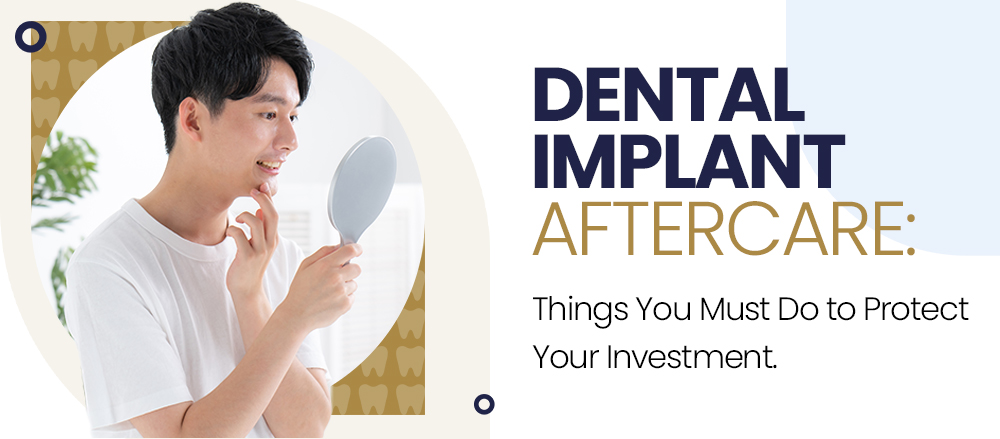Located at 20 Old Brompton Road – Just Steps from ![]() South Kensington Tube. Easy Access, Always.
South Kensington Tube. Easy Access, Always.
Located at 20 Old Brompton Road – Just Steps from ![]() South Kensington Tube. Easy Access, Always.
South Kensington Tube. Easy Access, Always.



Dental implants generally provide an effective solution for missing teeth. They offer a natural-looking and durable replacement that improves both function and appearance. Yet, success does not stop after dental implants placement. Proper aftercare is also essential to keep implants lasting and working well.
This guide explains how to care for your dental implant, from early recovery steps to long-term maintenance.
The first days and weeks after a dental implant placement are very important. During this time, the implant fuses with the jawbone in a process called osseointegration. This step is key to your implant’s stability plus long-term success, making proper aftercare essential.
Dental implants are designed to work like natural teeth. But, like real teeth, they need careful care to stay healthy and fully functional. Ignoring aftercare can result in problems such as implant failure, infection or bone loss. In general, following the recommended care steps protects your implant and also ensures you enjoy its benefits for many years ahead.
Immediately after dental implants in London, the dentist will give clear instructions to adhere to for the first days of recovery. This period is very delicate, so it is important to follow these guidelines carefully.
These post-procedure care guides include:
Some slight swelling and mild pain are normal following your implant placement. Over-the-counter painkillers can help ease discomfort. Placing a wrapped ice pack on the area may also minimise swelling. In addition, it is advisable to avoid heavy activity for a few days so as to let your body recuperate properly.
Keeping your mouth clean is very important, even right after the dental implant procedure. However, you should take caution not to interferewith the implant site. Rinse gently usinga mild saltwater mix to reduce infection risk as well as keep the site clean. Do notbrush the implant area for the first few days after placement. Focus on cleaning your other teeth and tongue instead in order to maintain overall hygiene.
After your implant, your diet should only be composed of soft and gentle foods. Eat foods like yoghurt, soups, and mashed potatoes. Similarly, keep off hot, solid, or spicy foods that may irritate the implant area. Slowly return to hard foods as you heal, usually after a week or following your dentist’s advice.
After the first recovery period, continuing care is key to keeping your dental implants healthy for a long time. Fortunately, caring for them is much like caring for natural teeth.
These are the long-term care tips to consider:
Just like natural teeth, dental implants need frequent brushing and flossing. It is recommended to opt for a soft toothbrush and gentle toothpaste to protect the implant and nearby gums from damage. Floss carefully around the implant to remove food particles and plaque. This aids in preventing gum disease or peri-implantitis, which can affect implant stability.
Seeing your dentist regularly is important for dental implant care. These appointments let your dentist check the general health of your gums, implants and nearby teeth. Professional cleanings also maintain the health of your mouth and identify issues early on before they get worse.
Some everyday habits thatone practises are likely to reduce the lifespan of your dental implants. For example, smoking slows healing and even raises the possibility of implant failure. Also, refrain from using teeth as tools, like opening packages, since this can damage implants and even the natural teeth. In addition, those who grind their teeth at night should wear a nightguard so as to protect the implants.
Another vital component of long-term dental care is consuming a balanced diet that is known to support oral health. Foods high in minerals and vitamins, mainly calcium and vitamin D, promote bone health and the fusing of the implant. Also, remaining hydrated is important since dry mouth is likely to contribute to gum disease.
Many people worry about how long their implants will last and possible complications. Even though your dentist will discuss these during follow-up visits, it is helpful to stay informed.
Here is how you can address the common aftercare concerns and complications:
Dental implants can usually last a lifetime with the right care. Frequent check-ups and good oral hygiene keep implants healthy, which in turn extends their lifespan. Moreover, it is highly important to adhere to the dentist’s advice depending on your particular oral health needs.
Most dental implant procedures are usually successful; however, it is still important to keep a close eye on the warning signs of underlying issues. Ongoing pain, swelling or a loose implant should prompt a call to your dentist right away. Taking action early can prevent bigger problems as well asensure your implant lasts longer.
Your dentist plays a key role in the overall success of your dental implants. After placement, regular visits are essential to track the healing process and make sure recovery is on course.
Dentists give tailored advice on oral hygiene; they might recommend the best products for you and show you how to clean your teeth properly.They are also highly trained to spot problems early, such as infection or other complications. This ensures timely treatment, which in the end helps save time, money, and protects your implant.
Good communication is important as well. Discussing issues like discomfort or other concerns right away ensures your dentist acts quickly and supportslasting implant health.
Lastly, a strong relationship with your dentist builds the base of good aftercare.
Caring for your dental implants is just as important as the procedure itself. Your implants can last for many years to come and function like natural teeth with proper aftercare, regular check-ups, and healthy habits. Whether you have a single implant or are considering a complete set, remember that the full set of dental implants cost is a worthwhile investment in your oral health, confidence, and quality of life.